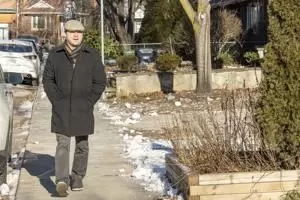Some bankruptcy trustees say they're getting more calls from preconstruction homebuyers — a trend likely to continue
Share- Nishadil
- January 17, 2024
- 0 Comments
- 6 minutes read
- 881 Views

Some bankruptcy trustees say they're getting more calls from preconstruction homebuyers — a trend likely to continue
Some GTA based bankruptcy trustees say there's been an uptick in panicked pre construction buyers either coming to them for advice or to file for bankruptcy.
Since the spring, Scott Terrio has encountered roughly a dozen homebuyers unable to close on their pre construction property, as appraisals fall hundreds of thousands of dollars short. It's the first time he's ever encountered such buyers in his 14 years in consumer insolvency. Distressed and unable to secure financing for the unit they bought two or three years ago, they come to him, unsure of their next steps.
"I really hadn't seen this before 2023," said Toronto's Terrio, manager of consumer insolvency at Hoyes, Michalos & Associates. "It's very telling of things to come." During the pandemic, the Bank of Canada set the overnight lending rate to 0.25 per cent to help the struggling economy, making it easier for people to borrow money.
It led to historically low mortgage interest rates, and buyers piled in, resulting in a boom of pre construction real estate. But since the central bank began hiking rates in March 2022 to cool swelling inflation, interest rates on mortgages have drastically increased and home prices have dropped by as much as 40 per cent in parts of the GTA.
In its wake, some GTA based bankruptcy trustees say they've noticed an uptick of panicked pre construction buyers either coming to them for advice, or in some instances, filing for bankruptcy. And the pain doesn't stop there, as experts say more developers are choosing to take legal action on those unable to close, mounting financial burden to the buyers, who see bankruptcy as their last resort.
As more closings approach in 2024, experts say, the trend is likely to continue. "What you have are people who bought at the peak and are now closing at the trough," Terrio said. "For pre built property you really need that appraisal to come in, and during a housing downturn it results in people being unable to close." If the appraisal comes in with a significant shortfall, putting the property up for an assignment sale, doesn't help the situation, he added.
That's because for a new condo building to be built, to finance the project. On average, it takes three to five years for a mid to high density building to be built from start to finish. That means developers rely on the sale of the units to see the construction of the building to the finish line.
Previously, if a buyer was unable to close on the project, they would resell the unit using an assignment sale — a legal transaction in which the original pre construction condo buyer transfers the rights and obligations of the purchase agreement to another buyer — which could allow them to make more money or at least break even, but because condo prices have dropped substantially they're having to sell at a loss.
In January 2022, one of Terrio's clients bought a half completed pre construction condo in north Toronto for $659,000 with a $35,000 deposit. In the summer of 2023, the unit was ready for occupancy but the appraisal came in at $400,000 — as interest rates skyrocketed and prices dropped. As a result, they were unable to secure financing for the unit and lost their deposit.
A month later, they received a letter from the developers' lawyer threatening to sue if they didn't take occupancy. They're still waiting to see if a lawsuit will materialize. What stands out to Joshua Harris, partner at Harris & Partners, is that previously if a pre construction buyer was unable to close, the developer would then sell the property to a new buyer for even more money.
Because there was no financial shortfall there was no case for developers to sue buyers who dropped out of the deal. "What we're seeing now is these properties being sold for less than when the pre construction buyer bought it," he said. "So we're seeing more developers pursuing these people in attempt to get the money recovered." Harris said his practice has seen an increase in these types of debts over the last couple of years, but they aren't the main reason people are coming to the firm.
Nevertheless, there will "no doubt continue to be a trend" of pre construction buyers seeking help from bankruptcy trustees. Mihir Chande, a licensed insolvency trustee at Chande & Company Inc., said since the fall he's dealt with more real estate related issues, accounting for 20 per cent of calls, with the majority stemming from pre construction buyers.
Around half were able to settle with the developer, while the other half moved to the next stage of formally filing to obtain legal protection from creditors. If rejected, they would then file a bankruptcy. "Bankruptcy really is the last option," he said. "We try to do anything we can to get them to settle." It's been surprising dealing with pre construction buyers, Chande added, as home prices have, for the most part, increased steadily since the 2008 financial crisis.
His clients come from "all over," in the GTA including Scarborough, Richmond Hill, and Burlington. "I think in 2024 we'll be getting even more calls as closings come due," he said, "and the stress of interest rates takes a toll on even more people.".
Disclaimer: This article was generated in part using artificial intelligence and may contain errors or omissions. The content is provided for informational purposes only and does not constitute professional advice. We makes no representations or warranties regarding its accuracy, completeness, or reliability. Readers are advised to verify the information independently before relying on







